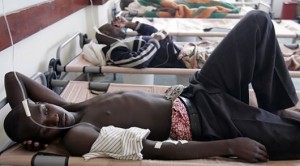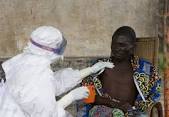 In spite of the fact that many health facilities in the Greater Accra Region recorded high numbers of cholera cases in 2014, TV3’s Catherine Frempong reports that holding centres which were to be constructed to arrest a possible outbreak in subsequent years were yet to be completed.
In spite of the fact that many health facilities in the Greater Accra Region recorded high numbers of cholera cases in 2014, TV3’s Catherine Frempong reports that holding centres which were to be constructed to arrest a possible outbreak in subsequent years were yet to be completed.
This means pressure on health facilities could worsen in 2015, as nearly a hundred cases have been recorded in the Greater Accra Region alone. The construction of the holding centres which started during last year’s outbreak have mostly stalled, while others have broken down.
In 2014, the Greater Accra Region alone saw over 20,000 cholera cases, with over 2,000 deaths. The number of cases recorded nationally in 1983 was 14,160, the deadliest outbreak then.
“We did not declare the epidemic over so we didn’t get to zero before we ended the year last year. We were still recording cases even in December. But it had reduced drastically compared to what we were recording in the middle of the year when we had the rains” that’s according to Greater Accra Regional Health Director Dr. Linda Van-Otoo.
The outbreak last year exposed the unpreparedness of most health facilities as majority of them had no cholera holding bays, whiles those which had were overwhelmed by inadequate space.
According to health officials, medications and gloves were a challenge due to the large numbers, compelling them to strategize at dealing with the disease in the long-term.
“What we are doing very quickly is to see that we expand the facilities. We recognise that there is still much more to do” another health official said.
A year after the outbreak, very little has been done to minimize its impact and to prevent or manage future occurrences. The 2015 budget for instance made no allocation for fighting cholera in case of an outbreak.
And the President in his state of nation address did not comment on it. The unpreparedness of health facilities is clear, cholera bays are non-existent, and those available are in poor condition. This was confirmed by the Greater Accra Regional Health Director, Dr. Linda Vanotoo to TV3.
“Last year there were challenges for us and this year there are still some challenges with them because they have to put in a special area to treat them so that they don’t infect others and all of that. Unfortunately for us, some of the reception areas are bad and cannot take any cases now”.
The Ridge Hospital OPD at Adabrabraka as of Thursday March 18, had 90 cases. The cholera bay, which hosted patients last year, is no longer reliable. Cases are now treated at the OPD.
“The bed that they lie on has a hole in it and a bucket is put under the hole; so when the faces come they just come as if they’ve turned on the tap. So sitting or even lying on a mattress where there is no hole will not be good. So those are the areas we also need improvement in”.
LEKMA Hospital, though last year recorded 1, 427 cases with 18 deaths, using a makeshift ward, a cholera bay which started after the outbreak has stalled; and already two cases have been reported.
“If we run into the epidemic that we had last year, it will be a big challenge for us if that isolation centre is not completed as soon as possible; a health official at LEKMA cautioned.
The Greater Accra Regional Health Director appealed to individuals and corporate organizations to assist the health facilities to complete the Cholera isolation centres. Dr. Linda Van-Otoo confirmed that the region alone has recorded 100 cases as of Thursday March 18, 2015, and thus asked residents to observe good hygienic practices to prevent the disease.
The Greater Accra Region recorded the highest cases last year, an indication that the region has one of the worst unsanitary conditions. Health authorities are worried people continue to live in unsanitary conditions as some openly defecate and eat from unhygienic sources.
“If someone gets cholera, basically the person has eaten faeces that has the germ in it either through food or water. It can easily spread to another person but we can still prevent it and protect ourselves”.
She says the directorate will intensify public education and also advised people to report cases on time once they detect the signs.
Our hope is that people will listen and not buy food that is uncovered, near a gutter and cold. And also when you are washing your hands, you need to use soap and running water before you eat” she cautioned.





